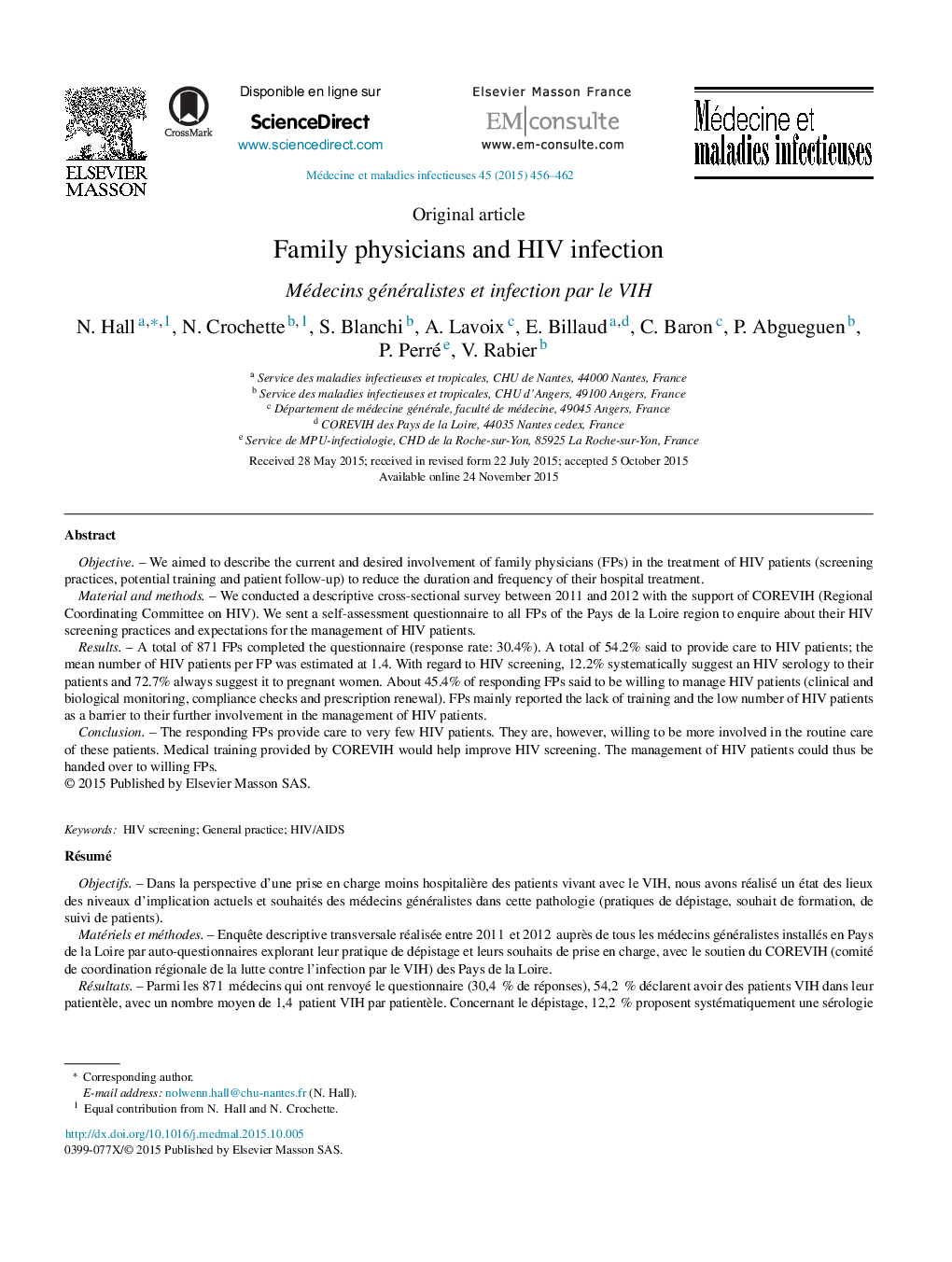| کد مقاله | کد نشریه | سال انتشار | مقاله انگلیسی | نسخه تمام متن |
|---|---|---|---|---|
| 3412436 | 1593611 | 2015 | 7 صفحه PDF | دانلود رایگان |

ObjectiveWe aimed to describe the current and desired involvement of family physicians (FPs) in the treatment of HIV patients (screening practices, potential training and patient follow-up) to reduce the duration and frequency of their hospital treatment.Material and methodsWe conducted a descriptive cross-sectional survey between 2011 and 2012 with the support of COREVIH (Regional Coordinating Committee on HIV). We sent a self-assessment questionnaire to all FPs of the Pays de la Loire region to enquire about their HIV screening practices and expectations for the management of HIV patients.ResultsA total of 871 FPs completed the questionnaire (response rate: 30.4%). A total of 54.2% said to provide care to HIV patients; the mean number of HIV patients per FP was estimated at 1.4. With regard to HIV screening, 12.2% systematically suggest an HIV serology to their patients and 72.7% always suggest it to pregnant women. About 45.4% of responding FPs said to be willing to manage HIV patients (clinical and biological monitoring, compliance checks and prescription renewal). FPs mainly reported the lack of training and the low number of HIV patients as a barrier to their further involvement in the management of HIV patients.ConclusionThe responding FPs provide care to very few HIV patients. They are, however, willing to be more involved in the routine care of these patients. Medical training provided by COREVIH would help improve HIV screening. The management of HIV patients could thus be handed over to willing FPs.
RésuméObjectifsDans la perspective d’une prise en charge moins hospitalière des patients vivant avec le VIH, nous avons réalisé un état des lieux des niveaux d’implication actuels et souhaités des médecins généralistes dans cette pathologie (pratiques de dépistage, souhait de formation, de suivi de patients).Matériels et méthodesEnquête descriptive transversale réalisée entre 2011 et 2012 auprès de tous les médecins généralistes installés en Pays de la Loire par auto-questionnaires explorant leur pratique de dépistage et leurs souhaits de prise en charge, avec le soutien du COREVIH (comité de coordination régionale de la lutte contre l’infection par le VIH) des Pays de la Loire.RésultatsParmi les 871 médecins qui ont renvoyé le questionnaire (30,4 % de réponses), 54,2 % déclarent avoir des patients VIH dans leur patientèle, avec un nombre moyen de 1,4 patient VIH par patientèle. Concernant le dépistage, 12,2 % proposent systématiquement une sérologie VIH à leurs patients, 72,7 % prescrivent toujours une sérologie aux femmes enceintes. Parmi les médecins interrogés, 45,4 % souhaitent prendre en charge des patients VIH (suivi clinico-biologique, soutien à l’observance, renouvellement de traitement). Les principaux freins évoqués sont une formation insuffisante et un investissement disproportionné compte tenu du faible nombre de patients VIH dans leur patientèle.ConclusionLes médecins interrogés suivent très peu de patients VIH mais sont plutôt favorables au suivi de ces patients dans le cadre de soins courants. Des formations via le COREVIH permettraient d’améliorer l’offre de dépistage et d’envisager un relais du suivi en ville en ciblant ces médecins intéressés.
Journal: Médecine et Maladies Infectieuses - Volume 45, Issues 11–12, November–December 2015, Pages 456–462